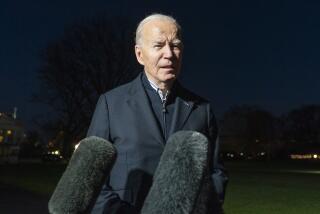At least 52 Iraqis killed in 3 attacks
- Share via
BAGHDAD — Bombs and mortars claimed the lives of at least 52 Iraqis and two U.S. soldiers Monday, a day in which Vice President Dick Cheney and Republican presidential candidate Sen. John McCain made separate visits to Iraq to focus on American successes as the war enters its sixth year.
Initial reports said a female suicide bomber killed 43 people and wounded 74 others in the Shiite Muslim holy city of Karbala. Karbala province media director Abdel Ameer Hamoun said the woman detonated the explosives in the early evening on a street packed with shoppers not far from the Imam Hussein shrine, one of the holiest places in Shiite Islam.
Later, Karbala Police Chief Gen. Raad Shakir Jawdat said the explosion may have been caused by a bomb placed on the street.
The two American soldiers were killed by a roadside bomb north of Baghdad, the U.S. military said.
In Baghdad, a car bomb in the Karada commercial district, which has been targeted by a series of bombings in the last two weeks, killed three people and wounded eight. Mortar rounds landed in the Shiite neighborhood of Baladiyat in east Baghdad, claiming the lives of six children, police said.
The Karbala attack occurred after McCain, the presumptive Republican presidential nominee, and Cheney made near-identical claims about the success of the U.S. troop buildup last year, which has been credited with helping cool the sectarian warfare across Iraq that erupted after the March 2003 U.S.-led invasion.
“We are succeeding. And we can succeed, and American casualties overall are way down,” McCain told CNN in an interview during his one-day visit.
McCain also criticized the position of the Democratic presidential contenders, who favor withdrawing more U.S. troops from Iraq. “I just think what that means is Al Qaeda wins. They tell the world that. And we fight here again and around the Middle East,” McCain told the cable channel ahead of his departure for Israel and Europe.
Cheney, who also arrived on an unannounced visit Monday, argued strongly against a hasty reduction of troops after the last of five additional combat brigades sent to Iraq in 2007 leaves the country in July.
“It would be a mistake now to be so eager to draw down the force that we risk putting the outcome in jeopardy,” he said.
Cheney, one of the war’s chief architects, defended his legacy after meeting with Iraqi leaders. “If you look back on those five years, it has been a difficult, challenging but nonetheless successful endeavor,” he said. The vice president met with Iraqi Prime Minister Nouri Maliki, among others, and lauded Iraqi officials for progress on controversial legislation and on improved security. Maliki said they discussed a long-term security agreement between the United States and Iraq that would govern American troops in the country after a United Nations mandate expires at the end of the year.
Cheney was next due to visit Oman, and his trip will also include stops in Saudi Arabia, Turkey, Israel and the West Bank.
The visits came ahead of next month’s report to Congress by U.S. Ambassador Ryan Crocker and American military commander Gen. David H. Petraeus. The two last reported to Congress in September, before the effect of an additional 28,500 U.S. forces was fully felt.
Back in the U.S., Democratic presidential contender Sen. Hillary Rodham Clinton criticized the war Monday, saying it could ultimately cost America well over a trillion dollars.
Sen. Barack Obama, Clinton’s foe for the nomination, has also called for withdrawing troops from Iraq and has criticized Clinton for initially backing the decision to go to war.
Tens of thousands of Iraqis and nearly 4,000 American troops have died since the war began five years ago this week.
In Karbala on Monday, the blast occurred in an area called Mukhaim, believed to be where the revered Shiite figure Hussein camped before his death in a battle in 680. It was also near the offices of radical Shiite cleric Muqtada Sadr, who last year imposed a cease-fire on his militia.
There was no immediate claim of responsibility for the attack, but it bore the hallmarks of Sunni Arab insurgents.
Sunni fighters have rarely carried out successful attacks in the Shiite south, and in the past, such grisly blasts have sparked revenge killings against Sunnis.
Sadr’s decision to restrain his fighters in the face of provocations has played a large part in the recent lull. Last month, about 700 were killed in Iraq, but American commanders say that even with the rising strife, the situation is better than last year, when Iraq’s sectarian violence claimed more than 1,500 lives a month, on average, according to icasualties.com.
Ibrahim Jazairi, 64, who lives near the blast site, said he had been preparing to pray when the explosion blew his home’s front door open, and children in his yard were knocked down. He ran outside.
“All I saw is human flesh thrown everywhere and blood in every spot,” Jazairi said.
“Thank God we were safe, thank God my daughters were safe. . . . All those victims lost their life for nothing.”
Journalists reported being clubbed by security forces when they tried to approach the scene.
--
--
Times staff writer Parker reported from Baghdad and special correspondent Fakhrildeen from Najaf.
Staff writer Saif Hameed contributed to this report.
More to Read
Sign up for Essential California
The most important California stories and recommendations in your inbox every morning.
You may occasionally receive promotional content from the Los Angeles Times.













